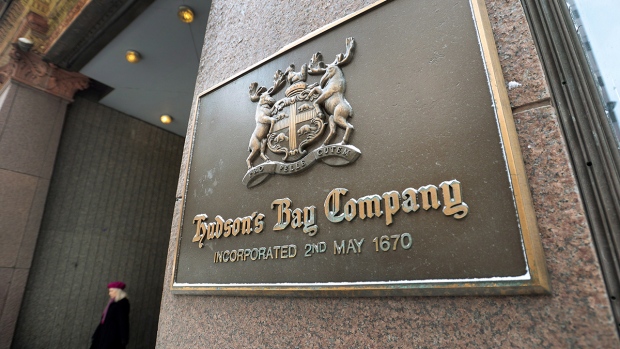TORONTO — Some former Hudson’s Bay employees have filed a class-action lawsuit seeking a share of the defunct retailer’s pension surplus.
The court filing was made on behalf of workers who were enrolled in a pension plan offered by Simpsons, a rival department store HBC bought in the 1970s.
The takeover made HBC the administrator of the Simpsons pension plan, which had a surplus at the time.
The court filing does not say how big the surplus was when the acquisition happened, but says annual pension statement reports HBC sent Simpsons workers showed that as of Jan. 1, 2024, there was about $167.03 million in a trust fund linked to HBC’s overall plan.
Any surplus the company has stands to become a flashpoint in HBC’s ongoing creditor protection case because lawyers have expressed doubt that the retailer will be able to repay the $1.1 billion it owed creditors when it collapsed.
The debt caused the business, once Canada’s oldest company, to close all of its stores over the summer, ending jobs for about 9,300 people.
HBC declined to comment on the class-action lawsuit, which was filed in June but flew under the radar until a judge in its creditor protection case mentioned it at a hearing earlier this week.
The class-action was filed by employment law firm Koskie Minsky LLP and names Telus and RBC Investment as respondents. Telus was appointed in April as the HBC pension plan administrator by the Financial Services Regulatory Authority of Ontario. RBC holds the assets of the plan.
The court filing making the case for Simpsons workers to get a share of any surplus left offers a peek at how HBC’s growth shaped its pension plans, but also pitted some staff against each another.
The document says HBC added Zellers employees to the Simpsons plan in 1994 and then Kmart staff in 1998.
Between 1994 and 2006, court documents filed by Koskie Minksy in HBC’s creditor protection case show HBC used about $111 million of the surplus assets originating from the Simpsons pension plan to cover defined contribution pension costs for Zellers and Kmart employees.
The moves angered former Simpsons employees who sued HBC to stop their surplus funding being used for the staff who had been rolled into the plan more recently.
The judge in that case ruled that HBC could use the Simpsons pension plan surplus to pay its obligations to the broader defined contribution group while the plan remained active.
However, he said if the plan is ever wound down, former Simpsons employees are entitled to the surplus assets in the plan, if there are any remaining.
HBC appealed several parts of the ruling, including a portion that ruled it wouldn’t be entitled to surplus assets. The Ontario Court of Appeal dismissed HBC’s cross appeal and the Supreme Court of Canada would not hear the case.
Workers enrolled in the Simpsons plan now say they are entitled to that surplus because of the judge’s prior ruling.
When the class action was first filed, Koskie Minsky said the Financial Services Regulatory Authority of Ontario reported HBC’s pension plan had 4,976 active members and about $460.07 million.
About 17,000 active and inactive members had defined contribution entitlements under the plan, the documents say.
